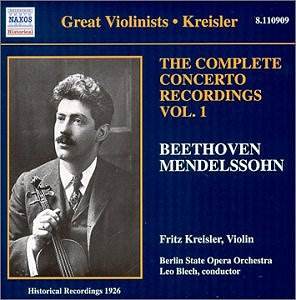Fritz Kreisler: Concerto Recordings-Vol. 1
LUDWIG VAN BEETHOVEN (1770 - 1827)
Violin Concerto in D
J.S.BACH (1685 - 1750)
Adagio from Sonata no.1
FELIX MENDELSSOHN (1809 - 1847)
'May Breezes' from Songs Without Words Op.62 No.1
Violin Concerto in E minor
 Fritz Kreisler (violin) Berlin
State Opera Orchestra/Leo Blech
Fritz Kreisler (violin) Berlin
State Opera Orchestra/Leo Blech
Arpàd Sàndor (piano)
Recorded Berlin 1926
 NAXOS 8.110909
[78:20]
NAXOS 8.110909
[78:20]
Crotchet
Amazon
UK
AmazonUS
CDNow

These wonderful performances have been lovingly transferred from 78s to CD
under the supervision of Mark Obert-Thorn, one of the most respected engineers
in this sphere. He has done a fine job, so that the mastery and artistry
of Kreisler, ably supported by Blech, shine out across the years. There is,
as you would expect, a fair amount of surface noise; but it remains at a
consistent level throughout, so that the ear quickly becomes accustomed to
it and it ceases to be a problem for the interested listener.
Kreisler's playing is legendary, and these performances do nothing to detract
from that legend. The interpretations are truthful and lacking in distortion,
yet are full of memorable moments, such as the B minor passage that begins
the development in the first movement of the Beethoven. Kreisler's playing
of his own cadenza in the same movement is breathtaking, even if it does
contain the much maligned contrapuntal combination of the first and second
subjects, which doesn't work musically at all. However, the double-stopping
required is so technically stunning that it's easy to forgive!
The slow movement of the Mendelssohn shows off Kreisler's sweet but never
cloying tone, while the second movement of the Beethoven has an inwardness
that takes us straight to the heart of the music. The Finale is approached
in a suitably cheerful and rustic way.
Orchestral playing is a little uncertain here and there, particularly at
the ends of cadenzas; this impression may be in part due to the balance,
which inevitably tends to favour the soloist. But Blech and his orchestra
accompany with sensitivity and mostly excellent ensemble.
There are a couple of shorter items, of which the performance of the Song
Without Words is particularly charming - Kreisler had a unique way with this
kind of 'lollipop'.
This is pure musical pleasure, not to be missed.
Gwyn Parry-Jones


